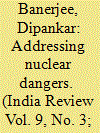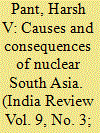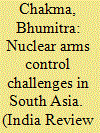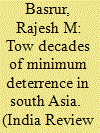| Srl | Item |
| 1 |
ID:
101078


|
|
|
|
|
| Publication |
2010.
|
| Summary/Abstract |
China has been a nuclear weapon power since October 1964 and India and Pakistan openly since May 1998. Each had its own reason to acquire nuclear weapons-Pakistan to counter India, India to counter both Pakistan and China, and Beijing has always viewed the U.S. and for some time the former Soviet Union as possible nuclear threats. Within Asia, no meaningful dialogue has ever been carried out between China, India and Pakistan on nuclear issues: either on confidence building, doctrine and safety, or on each other's perception of the nuclear threat. Even necessary risk reduction measures have not been attempted. However, some Track Two level dialogues have taken place and this has contributed to some understanding of nuclear policies, strategies and doctrines. In this backdrop, the present study examines the doctrine, strategy and command, and control arrangements prevailing in these countries and recommends the necessary confidence-building measures. These include greater transparency on doctrine, clearer examination of likely strategy and means to universalize "no first use."
|
|
|
|
|
|
|
|
|
|
|
|
|
|
|
|
| 2 |
ID:
101080


|
|
|
| 3 |
ID:
101077


|
|
|
|
|
| Publication |
2010.
|
| Summary/Abstract |
This article explores how it became possible for the former Indian Prime Minister, Atal Behari Vajpayee, to make a major trust-building initiative with his Pakistani counterpart, Nawaz Sharif, at the 1999 Lahore Summit. Building on security dilemma theorizing in the field of International Relations, the present article develops the concept of a "leap of trust" as a way of understanding how decision-makers trapped in security dilemmas might break through the psychology of distrust by a frame-breaking conciliatory move. This framework is then applied to the moves that led to the development of a trusting relationship between Sharif and Vajpayee. A few months later, Pakistan launched an attack across the Line of Control (LoC) and Vajpayee felt betrayed. I explore how far Sharif knew about his army's plans to attack at Kargil and ask whether he was prisoner of a Pakistani military machine that was intent on pursuing a military solution in Kashmir irrespective of any peace process that might be developing. The article examines the lessons that Vajpayee drew from Kargil and discusses his two further attempts to recover the trust that had developed at Lahore. I conclude with an analysis of the wider lessons of this case for the success of any future leaps of trust that Indian and Pakistani leaders might take.
|
|
|
|
|
|
|
|
|
|
|
|
|
|
|
|
| 4 |
ID:
101079


|
|
|
|
|
| Publication |
2010.
|
| Summary/Abstract |
The idea of arms control has hardly taken root in South Asia. The existing nuclear arms control measures between India and Pakistan are patently inadequate for addressing the pressing nuclear concerns of the region. Although there are compelling reasons for nuclear arms control, India and Pakistan are reluctant to undertake worthwhile arms control initiatives. There are three key reasons for this: India and Pakistan are currently at the formative phase of their nuclear force-building and at this stage they are unlikely to undertake arms control measures fearing that it may affect their future force-building plans; their intense political rivalry is unfavorable for successful arms control; the extra-regional links-the China factor-of South Asia's security dilemma hinders prospects for arms control in the region. Owing to these factors, the prospects for successful arms control between India and Pakistan are not great in the foreseeable future, although the question remains as to how long they can ignore the issue.
|
|
|
|
|
|
|
|
|
|
|
|
|
|
|
|
| 5 |
ID:
101076


|
|
|
|
|
| Publication |
2010.
|
| Summary/Abstract |
review of two decades of the India-Pakistan nuclear relationship shows that, like all nuclear rivalries, deterrence works at a minimal level regardless of beliefs about the requirements of deterrence. Also, like other nuclear rivalries, it displays a fundamentally schizophrenic behaviour pattern. When conflict draws close, India and Pakistan completely reject the usability of nuclear weapons and ignore the tenets of deterrence theory and doctrine; but when conflict is distant, they tend to behave as if the weapons are usable, which influences their doctrines and weapons acquisitions. The India-Pakistan case reveals a relatively cost-effective and risk-resistant minimalism, but is distorted by powerful elements of thinking-typified by the writings of Albert Wohlstetter-that has produced an arms race and a significant element of instability into the relationship
|
|
|
|
|
|
|
|
|
|
|
|
|
|
|
|